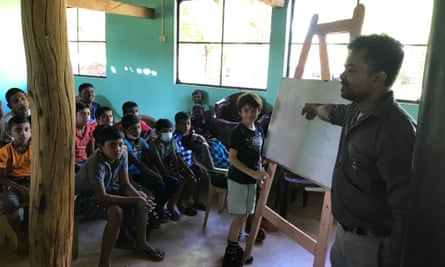Jungles, jackfruit and community tourism: this is Sri Lanka at its best
There is a moment of absolute stillness - the battered soccer ball whizzing through the air, all eyes following it, before it crashes into the window and tiny gasps escape from the little mouths. Fortunately, it rolls away, leaving the glass and the enclosed Buddha statue unharmed.
We are playing football on a dusty, sunny escarpment with a group of farm children, and in the midst of the excitement I nearly destroyed the religious relic in the village. But the game continues, with limbs flying all over the place, toes (mine) getting stomped on, and the ball continuing to fly skyward.
We're here to meet some of the 30 or so children who are part of Classroom in the Wild, a community outreach project launched in 2014 by Chamintha and Rajindra Jayasinghe, founders of Ayu in the Wild Holidays, to create opportunities for children in the most disconnected communities of Sri Lanka.
For these children, lack of access to learning English has stifled their progress, and for many of them joining their parents to work the land will be their only viable option. We meet them at their school - a hut accessible by a single road through the rice fields, about six kilometers from the world heritage site of Sigiriya. It's a wild and inaccessible area that requires up to four buses and a tuk-tuk ride, which has led some teachers to refuse to come.

The journey is long, even if we stay quite close, but the rewards are great and it leads to one of the most experiences most rewarding of our family holidays. There is a lot of laughter and shyness at first, even from our own children (Seb, eight, and Jemima, four), but there is the possibility of playing puns, and then the ice is well and truly broken when we start playing football.
There are bursts of conversation between games and we learn that children are mainly from families who grow vegetables and work in the rice fields; that they have learned to cohabit in this rural environment with the elephants (the children live in a community where human-elephant conflicts); and that their lessons continued during the pandemic - every Saturday morning they logged onto a single smartphone for an online lesson.
As we go, Sithumi, 14, stands in front of the class and in impeccable English tells us how much they enjoyed the day and asks us to come back.

There is a moment of absolute stillness - the battered soccer ball whizzing through the air, all eyes following it, before it crashes into the window and tiny gasps escape from the little mouths. Fortunately, it rolls away, leaving the glass and the enclosed Buddha statue unharmed.
We are playing football on a dusty, sunny escarpment with a group of farm children, and in the midst of the excitement I nearly destroyed the religious relic in the village. But the game continues, with limbs flying all over the place, toes (mine) getting stomped on, and the ball continuing to fly skyward.
We're here to meet some of the 30 or so children who are part of Classroom in the Wild, a community outreach project launched in 2014 by Chamintha and Rajindra Jayasinghe, founders of Ayu in the Wild Holidays, to create opportunities for children in the most disconnected communities of Sri Lanka.
For these children, lack of access to learning English has stifled their progress, and for many of them joining their parents to work the land will be their only viable option. We meet them at their school - a hut accessible by a single road through the rice fields, about six kilometers from the world heritage site of Sigiriya. It's a wild and inaccessible area that requires up to four buses and a tuk-tuk ride, which has led some teachers to refuse to come.

The journey is long, even if we stay quite close, but the rewards are great and it leads to one of the most experiences most rewarding of our family holidays. There is a lot of laughter and shyness at first, even from our own children (Seb, eight, and Jemima, four), but there is the possibility of playing puns, and then the ice is well and truly broken when we start playing football.
There are bursts of conversation between games and we learn that children are mainly from families who grow vegetables and work in the rice fields; that they have learned to cohabit in this rural environment with the elephants (the children live in a community where human-elephant conflicts); and that their lessons continued during the pandemic - every Saturday morning they logged onto a single smartphone for an online lesson.
As we go, Sithumi, 14, stands in front of the class and in impeccable English tells us how much they enjoyed the day and asks us to come back.
What's Your Reaction?















![Three of ID's top PR executives quit ad firm Powerhouse [EXCLUSIVE]](https://variety.com/wp-content/uploads/2023/02/ID-PR-Logo.jpg?#)







